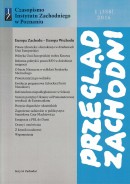Desperackie lekarstwo". Brytyjskie Ministerstwo Spraw Zagranicznych wobec „kwestii sudetoniemieckiej" (październik 1938 - grudzień 1945)
‘‘Desperate Medicine’’. The British Foreign Office and the ‘‘Sudeten German Issue’’ (October 1938 – December 1945)
Author(s): Martin D. BrownSubject(s): Politics / Political Sciences
Published by: Instytut Zachodni im. Zygmunta Wojciechowskiego
Summary/Abstract: British policy towards W. Jaksch and the ‘‘Sudeten German issue’’ from October 1938 to December 1945 was shaped on a short-term basis – in response to developments on the international scene and the voice of the public opinion. Following the signing of the Munich Pact, the British authorities offered the Sudeten German refugees financial aid, established political contacts with W. Jaksch and assumed a number of legal obligations. When the government of E. Bene turned out to be a more useful ally, the Foreign Office quietly backed out of providing assistance to the Sudeten Germans in Great Britain. The author presents the involvement of the British government in the development of plans to ‘‘transfer’’ the Sudeten Germans from Czechoslovakia: from 1940 the Foreign Office commissioned analyses on the usefulness of ‘‘human transfer’’. Ultimately, the allies came to recognize this ‘‘desperate medicine’’ as the most advantageous solution of the minority issue in Europe and improvement of regional security. The author describes the emergence of an opposition against those proposals in Great Britain. He shows how W. Jaksch unsuccessfully tried to prevent the plans of the relocation and how by putting them into question, together with a group of people who shaped the British public opinion he managed to have a decisive impact on Western historiography, initiating a debate that survived the cold war and continues even today.
Journal: Przegląd Zachodni
- Issue Year: 325/2008
- Issue No: 02
- Page Range: 45-70
- Page Count: 26
- Language: Polish

